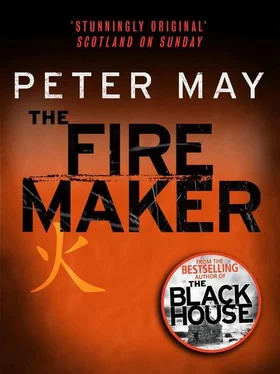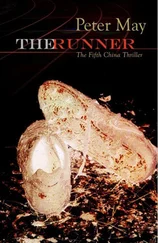Lily scowled, displeased to be excluded from this outing, but in no position to argue.
‘Bye-bye,’ Wu called after them, in English.
Margaret stopped by the door, struggling to recapture what seemed like a very distant memory of an hour spent with a phrase book on the plane. ‘ Zai jian ,’ she said eventually, eliciting some laughter and some applause, and a chorus of ‘bye-byes’ from the other detectives.
Li picked up a dark blue Beijing Jeep in the street outside and they turned south and then west along Dongzhimennei Street. They sat in silence for several minutes as he appeared to focus all concentration on negotiating the traffic. Eventually Margaret glanced at him and said, ‘Lily said the detectives told her it was your uncle who sent the feng shui man.’
‘Yes.’ Li was not inclined to talk about it, but Margaret persisted.
‘So, it’s not widely practised in China now? Feng shui .’
Li shrugged. ‘Perhaps. But not officially. I don’t know very much about it.’
‘That’s a shame. Since it was the Chinese who invented it. It was an American Chinese who took the class I attended. He told us that the whole philosophy arose from the practice of the ancient Chinese religion of Taoism.’
‘What does an American Chinese know about Taoism?’ Li was scathing.
‘More than you, apparently.’
Li gave expression to his annoyance with a blast of his horn at a cyclist. ‘Taoism,’ he said. ‘From the word tao , literally meaning “the way”. It teaches us we must all find a place for ourselves in the natural way of things that does not disrupt the function of the whole. When we accept our place in the world, we become more concerned for the consequences of our actions, since for every action there is a reaction, and everything we do has a consequence for others.’
Beyond her surprise at this sudden and unexpected articulation of the centuries-old philosophy, Margaret made the connection for the first time with what Bob had been trying to tell her earlier; about Chinese society and the way it is reflected in its legal system; the sublimation of the individual in favour of the collective good; the realisation that none of us is alone in this world, that we are all interdependent.
Almost as if reading her thoughts, Li went on, ‘Of course, this is not just a Chinese philosophy. It has expression in much Western thinking. “No man is an island, entire of itself; every man is a piece of the Continent, a part of the main…”’
Almost automatically, Margaret recalled the lines from her classes in English Lit. “Any man’s death diminishes me, because I am involved in Mankind; and therefore never send to know for whom the bell tolls; it tolls for thee.”’
‘Of course, John Donne was writing in seventeenth-century England,’ Li said. ‘He no doubt drew his inspiration from much older Chinese philosophies.’
Margaret could barely conceal her amazement. ‘They didn’t teach you John Donne at the University of Public Security.’
Li laughed at the idea. ‘No.’
‘At school?’
He shook his head. ‘My Uncle Yifu. He was educated at the American University in Beijing before the communists came to power in ’49. He was offered the chance to do a post-graduate course at Cambridge, in England. But he chose to stay and help build the new China.’ A shadow passed almost imperceptibly across his face. ‘You might say that my uncle was the embodiment of the philosophy of Taoism.’
‘And how did he help to build “the new China”?’ Margaret was sceptical.
But Li didn’t notice. His mind was transported to another place, another time. ‘He became a policeman.’
‘What?’
‘He was considered to be an “intellectual”. And in those days this was not a good thing to be. Free thinkers were dangerous. So he volunteered to join the police force and go to Tibet.’
Margaret blew a jet of air through pursed lips. ‘That’s a bit of a leap. From Cambridge post-grad to Tibetan cop.’
Li was philosophical. ‘It was how the world turned then. He and his wife walked to Tibet from their home in Sichuan.’
‘Walked!’ Margaret was incredulous.
‘There were very few roads in those days over the mountains to the roof of the world. It took them three months.’
This seemed extraordinary to Margaret. The only thing with which she could equate it was the brave trek west across the United States made by pioneers in the early nineteenth century. And yet this had been less than fifty years ago.
‘They brought him back to Beijing in 1960,’ Li said. ‘By the time he retired five years ago, he had become a Senior Commissioner, and was head of the Beijing Municipal Police. I have been staying with him in his apartment since I came here to the Public Security University.’
He wondered if Margaret could possibly divine from this how hard it had been for him to walk in the footsteps of such an uncle. Footsteps that had always been too big, the strides between them too long. If by some miracle he should ever manage to fill them and match the strides, he would be accused of having been given his uncle’s shoes. There was no way for him to win.
They were heading south now on North Xidan Avenue, and near its corner with West Chang’an Avenue Li pulled the car into the kerb outside a colourful restaurant with a red-and-green-striped wall and yellow awnings. A raised, double-sided entrance under a green-tiled arching roof led up to a self-service snack bar on the first floor. In a street jammed with bicycles parked side by side, row upon row under the trees, pavement hawkers of every description were selling their wares: face masks with extending and retracting moustaches; nylons that wouldn’t rip or ladder even when jabbed with a needle. An old lady sat with a pair of scales on which you could weigh yourself for a handful of jiao . The hawkers were attracting large crowds, who paused briefly to take in the blonde-haired, blue-eyed yangguizi who got out of the Jeep with the young Chinese. Margaret felt awkward and, not for the first time, noted that the Chinese were not in the least self-conscious about simply staring at her.
‘ Tianfu Douhua Zhuang ,’ Li said.
‘I’m sorry?’
He let her precede him up the steps. ‘It is the name of the restaurant. Tianfu meaning “land of abundance”, signifying my home province of Sichuan. Douhua Zhuang means “Tofu Village”. The food is excellent.’
The first floor was jammed with late diners cramming communal tables. Round the walls, pre-cooked dishes sat in bowls behind glass counters. People at the door were queuing for carry-out noodles. Li nodded towards the stairs. ‘There is a proper restaurant with a full menu on the second floor, but we are too late for lunch today. This is for snacks, but you can eat well. Okay?’
‘Sure,’ Margaret said, a little overwhelmed by the strangeness of it all. ‘But you choose. I wouldn’t know where to begin.’
‘Okay. You like noodles?’ She nodded, and he grabbed a tray and got them each a bowl of noodles. Then they made their way round the glass counters, Li choosing a range of dishes: boiled tofu with sauce, won-ton, skewered meat, pickled vegetable, sweet dumplings. Everything was smothered with spicy sauces. Li got them each a beer, paid and then found them a corner at a busy table, and they sat down. Conversation lulled momentarily at the table, curious faces turning in their direction, and then the pursuits of idle gossip once more took over and Li and Margaret were relegated to happy anonymity.
‘So…’ Margaret was anxious to pick up their conversation from the car. ‘You’re still living with your aunt and uncle?’
Читать дальше












